Last updated on July 5th, 2024 at 12:36 am
This is a refrigerator or canned dill pickles recipe. It is a simple recipe that took years to find. Our family loves eating cucumbers like this. Enjoy them within 24 hours as a delicious snack or process the mason jars and they will be shelf stable for a few years. No matter which way you prefer, this dill pickle is a crowd pleaser recipe.
*Post contains affiliate links* for more information please read the disclaimer on the About Us page.
Simple and Tasty Best Dill Pickles Recipe
These incredibly simple pickles have just the right amount of onion, dill and vinegar taste. They are crunchy and refreshing right out of the refrigerator. This recipe can be used for canning or forget the canning and store in the refrigerator. At our house, they get eaten right away anyway.
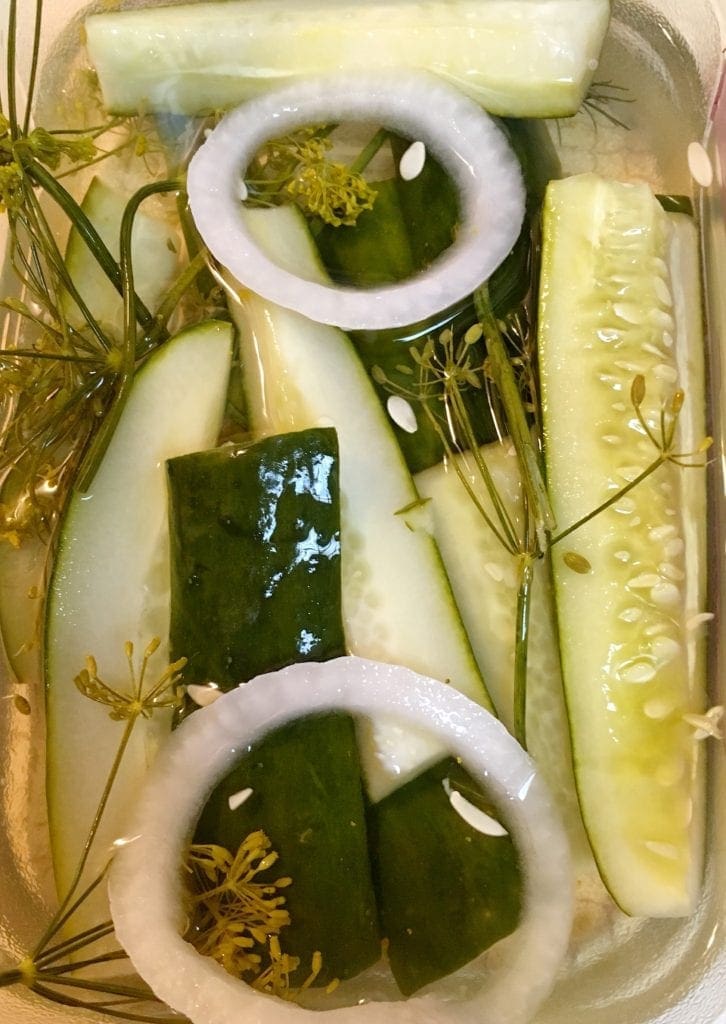
When I am bringing some pickles to a party, I place them in a bit larger plastic container with a tight fitting lid. Add some of the brine, dill and onions. Some people enjoy eating the pickled onions just as much as they do the homemade refrigerator pickles.
I never have any to take home and people are always asking for the easy refrigerator dill pickles recipe.
What Cucumbers are Best for Pickling?
This recipe is best if you get the garden cucumbers, Kirby cucumbers. The small ones that are bumpy. Sometimes, they might be called a dill cucumber.
We love to visit farmers markets and purchase produce when it is in season. When we find pickling cucumbers we know it is a perfect time to whip up a batch of these quick pickles.
You could use the long English cucumbers that are available in the grocery store if needed.
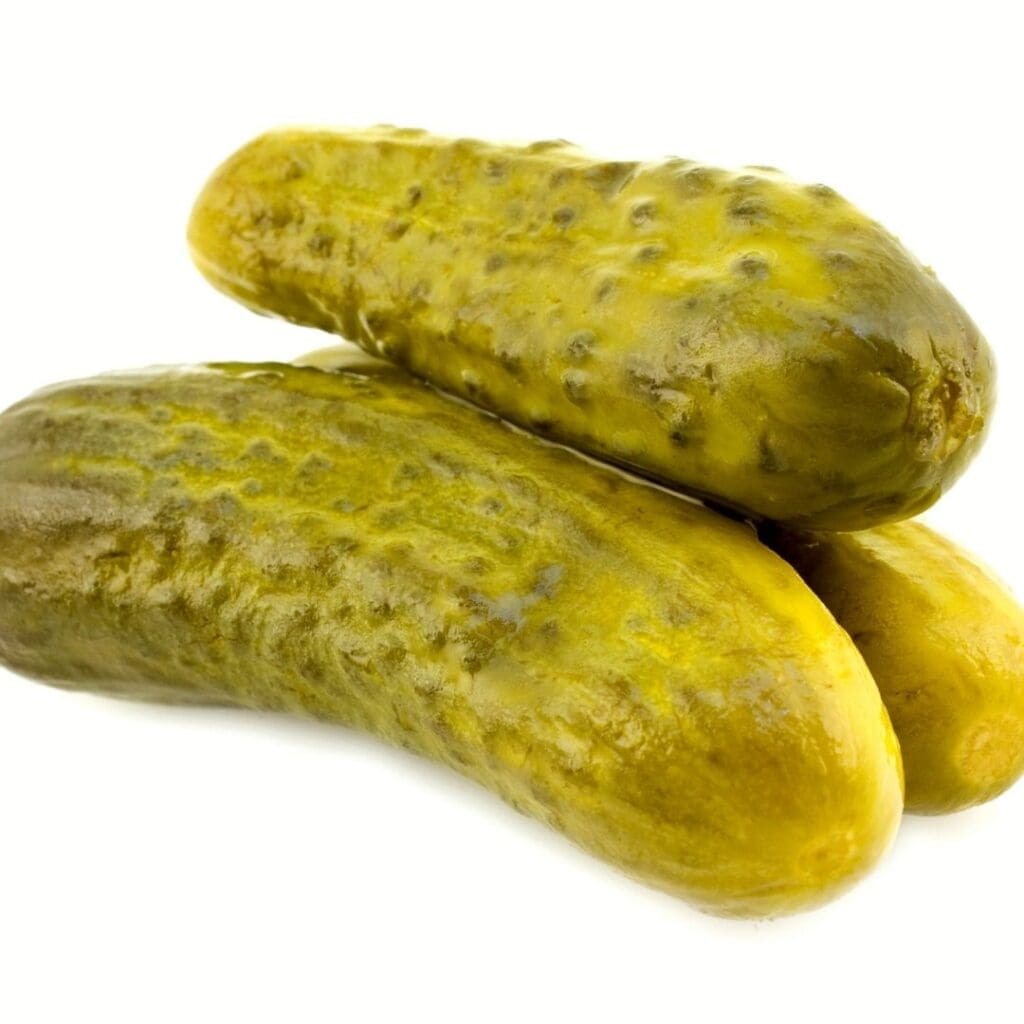
Finding the Recipe for the Dills
For years, my mom would get buy the best pickles from some lady that we never had the pleasure of meeting. Every Holiday meal included 2-3 quarts of these dill pickles. We all ate them like they were going out of style.
In an effort to make these dill pickles for our family, I tried many recipes. However, they have not lived up to the recipe. Finally, my daughter and I tasted a pickle that was the dill pickle recipe that we have been searching for! Yay! We even obtained the recipe. There was excitement for the whole family with this news. The search was over.
Sharing Our Best Homemade Pickles Recipe With You
Because we tried so many recipes for years, we don’t’ want you to have to go through the same search as us. Here is the recipe for the dill pickle.
Our friend JoAnn called it a Russian Dill Pickle; however, when I look at all of those recipes, they all have a lot more spices in their recipe such as mustard seed, coriander seed and dill seed. However, we like the simple taste of this recipe. It is just an easy recipe for perfect pickles with minimal ingredients and effort with great results.
Hope you and your family does too.
Another difference is that this recipe uses onion rather than fresh garlic. While you can use garlic, it will change the taste of the pickles.
Pickle Other Garden Produce and Mushrooms too
A great way to use this brine is for pickling cauliflower, pearl onions, broccoli, carrot, and even mushrooms. My husband love the mushrooms quite a bit.
Another recipe that is an annual recipe to make are the pickled beets. Another easy recipe that we enjoy throughout the year once made.
Give it a try, I am guessing you will like this delicious and crunchy goodness too.
Do You Have to Slice the Cucumbers for Pickles?
You can leave the cucumbers whole or slice them into spears. If the cucumber is overgrown, I always slice them into spears. If I can find cukes that are the perfect size they will be about 4 inches long. Then I will leave them whole.
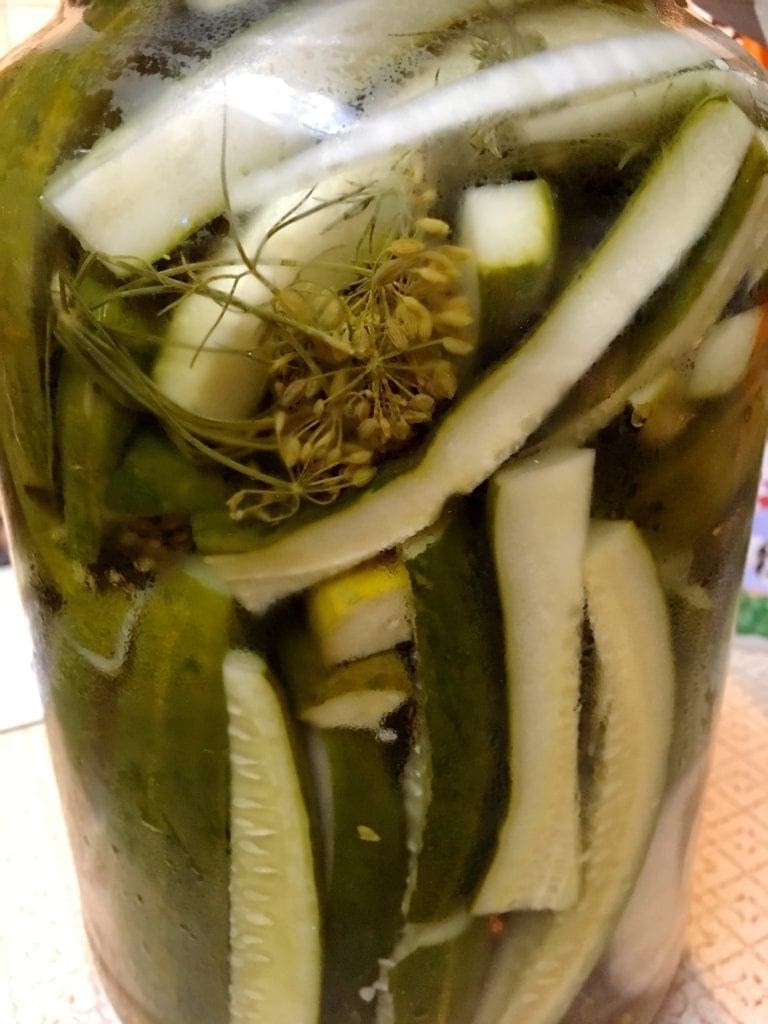
Using a Gallon Glass Jar for the Brine
Where to find gallon glass jars safe for making refrigerator pickles? Here is a wonderful option for you. the glass can be used over and over. Since this recipe is kept in the refrigerator, the cover can also be used again and again too.
An easy way to sterilize the jars is in the dishwasher. If you do not have the luxury of having on, you can boil the jars and lids in water for 10 minutes.
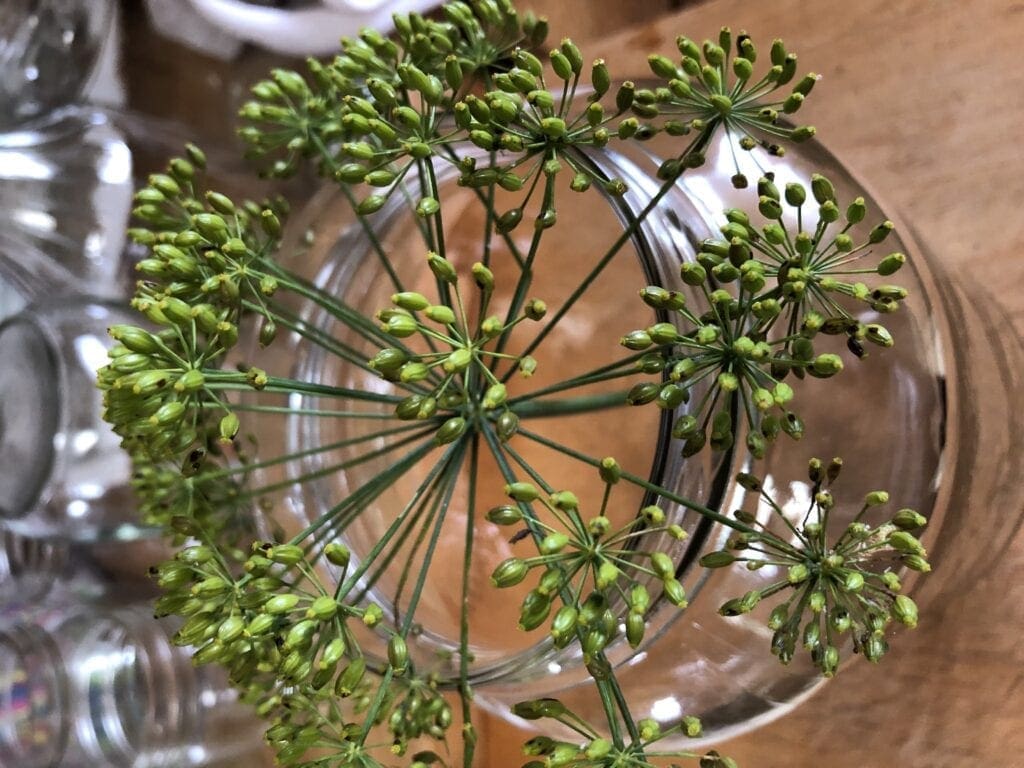
Ingredients for Classic Dill Pickles
This a great recipe that is an easy way to preserve cucumbers for months in the refrigerator or years if you can these pickles. Pro tip. While these quick pickles are ready to eat overnight, the quart jars can be processed in a water bath and you can store them on the shelf for a few years.
Pickling Cucumbers. Kirby cucumbers, Gherkins, or another cucumber that has minimal seeds will work well with this recipe. However, when I have a neighbor bring over a box of cucumbers from their garden, I will use that too. So, really, any kind of garden cucumber will work.
Water. The water helps ensure that there is enough liquid to cover the cukes and even out the taste of the other ingredients.
White Vinegar. Distilled white vinegar is best. Some folks will want to use an apple cider vinegar or rice vinegar. They can be substituted; however, their use will change the taste of the dill pickle.
Granulated Sugar. This is the sugar that you most likely have on your pantry shelf.
Canning Salt. If you are unable to find canning salt, I have substituted coarse salt. However pickling sale is best because it does not contain iodine and anticaking agents that are often added to table salt. Canning salt dissolves easily and since it does not have other additives, it is a great choice for pickling.
Dill Sprigs. Just a few springs of fresh dill for each jar is all you need.
White Onion. I like the flavor of the white onion; however, you can use a yellow onion or red onion for this recipe. They all work well.
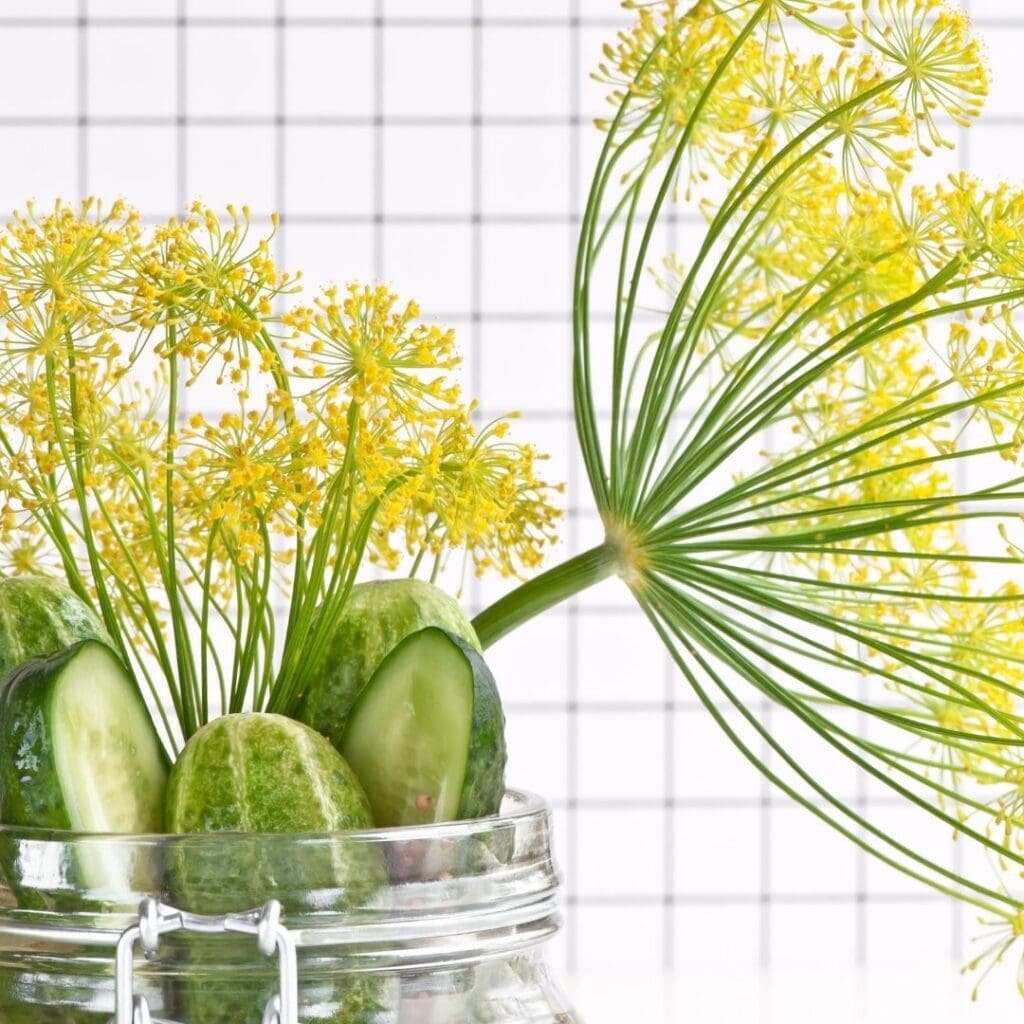
How to Make the Refrigerator Dill Pickle Recipe
- Sterilize jars and lids by immersing in boiling water for at least 10 minutes. Or if using a gallon glass jar, I just use the dishwasher to sterilize the containers and lids.
- Wash the cucumbers. If they are a bit on the larger side or if you like pickle spears, slice pickles ½ inch thick lengthwise.
- Pack in jars with several white onion slices and 2 heads of dill. Note, I made two gallon jars of pickles therefore, each gallon gets half an onion and 1 head of dill.
- In a large saucepan, combine the water, sugar, vinegar, and salt. Bring to a boil and stir until the sugar is dissolved.
- Pour the hot brine over the cucumbers in the jars and seal the lids.
- That’s it, let sit out to cool to room temperature and place in the refrigerator overnight. Within 24 hours, the pickles are ready to eat.
What is a Head of Dill?
A head of dill is the whole umbrella of dill shown in the photo above. If you are using just a spring of dill, it is just one of the smaller heads that are part of the whole head.
Can you Substitute Dried Dill for Fresh Dill?
The answer is yes, you can. For a 3-5″ (8 to 12 cm ) sprig of fresh dill, you can substitute 1/4 teaspoon of dried dill weed. However, fresh dill is a must in my opinion. I have tried using dried dill and it just does not have the same dill flavor profile. Even if you add extra, it just does not achieve that taste. Therefore, I recommend using fresh dill. Pro tip. If you have more dill than you can use freeze it in plastic freezer bags. The frozen dill works great in this dill pickle recipe.
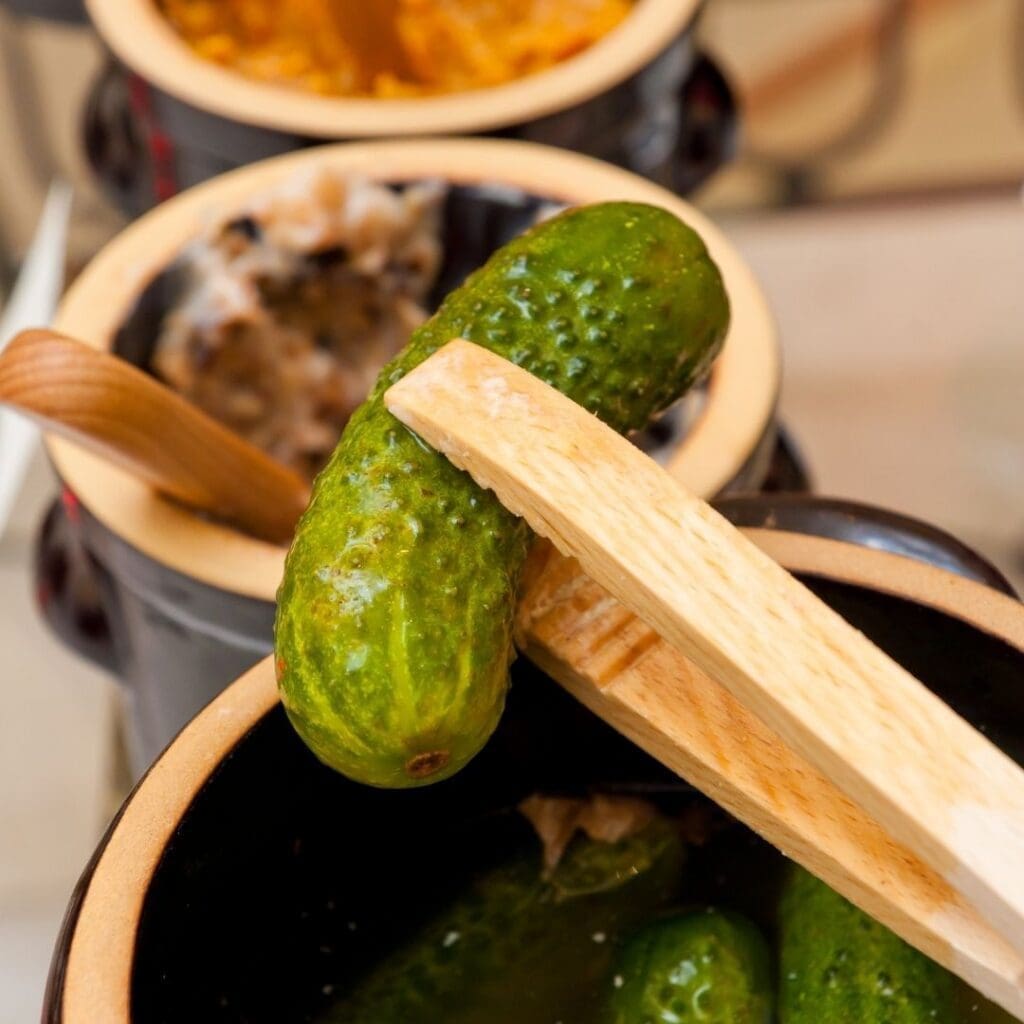
How Long Will Refrigerator Pickles Last?
These refrigerator dill pickles will last up to 4 months in the refrigerator. However, do not remove pickles with your fingers as it can contaminate the vinegar mixture with germs. Use a tongs or other utensil to remove the pickle.
While I have had them last more than four months, the cucumbers are a bit less crunchy.
How can You Tell if Pickles Have Gone Bad?
Look for signs of visual spoilage. A cloudy brine means that they have gone bad. If the cucumbers are turning a translucent color, this is another sign.
Additionally, when you open the jar of pickles pay attention to how they smell. If you notice a pungent smell, that is another sign that it is time to dispose of the pickles.
Refrigerator or Canned Dill Pickles
As an Amazon Associate I earn from qualifying purchases.
Kitchen Essentials
Ingredients
- 10 Lbs. Cucumbers Washed
- 14 Cups water
- 4 Cups White Vinegar
- 4 Cups granulated sugar
- 1/2 Cup Canning Salt Coarse Salt will work too
- 32 Springs Dill 3-4 springs per jar
- 1 Large White Onion Sliced
text ingredients
Instructions
- Sterilize jars and lids by immersing in boiling water for at least 10 minutes. Or if using a gallon glass jar, I just use the dishwasher to sterilize the containers and lids.
- Wash the cucumbers. If they are a bit on the larger side or if you like pickle spears, slice pickles ½ inch thick lengthwise.
- Pack in jars with several white onion slices and 2 heads of dill. Note, I made two gallon jars of pickles therefore, each gallon gets half an onion and 1 head of dill.
- In a large saucepan, combine the water, sugar, vinegar, and salt. Bring to a boil and stir until the sugar is dissolved.
- Pour the hot brine over the cucumbers in the jars and seal the lids.
- That’s it, let sit out to cool to room temperature and place in the refrigerator overnight. Within 24 hours, the pickles are ready to eat.
Your Own Private Notes
Notes
- Place a rack in the bottom of a large stockpot and fill halfway with hot water. Bring to a simmer, then carefully lower the jars into the pot using a holder or at least a hot pad. Leave a 2-inch space between the jars. Pour in more boiling water if necessary until the water level is at least 1 inch above the tops of the jars. Bring the water to a full boil, cover the pot, and process for 10 minutes.
- Carefully remove jars from stockpot and lace on a counter that has a towel laid out. Let sit to cool. While the jars cool, they will begin to make a popping sound as the lids begin to seal. When cool, push the center of each lid to make sure that it is sealed. If the lid makes a clicking noise or has any give at all, it is not sealed. The jars that did not seal should be refrigerated and eaten within 3-4 months.
Nutrition
A few of my favorite things
The Power of Positivity
If you loved this post, please share. It helps to show me that these types of posts are helpful – thank you!
I hope that you liked this recipe. If you are looking for more ideas on what to make, here are a few other recipes that you may enjoy.
[pt_view id=”4841271vuh”]

You can find Victoria crocheting, quilting, and creating recipes. She has cooked in restaurants for over 20 years, including many larger parties. She learned to crochet when she was just 11 years old and has been crocheting ever since; over 50 years now. Over 40 years ago, she loved her first class in sewing and continues to hone her skills in quilting. Many have enjoyed the handmade gifts over the years. In her professional career, she has worked in management in a wide variety of businesses including higher education as a dean of a division. All the while attending college part-time to achieve her doctorate in higher education with an emphasis in e-learning.

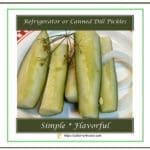
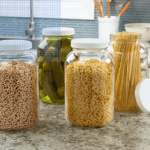
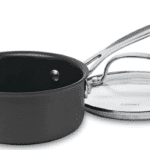
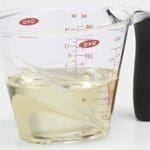
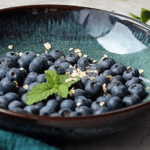
I think I have found my new favorite pickle. Thanks for sharing this one!
You are so welcome. It always makes my day when someone has found value in the blog information. Enjoy those pickles, I know we do.